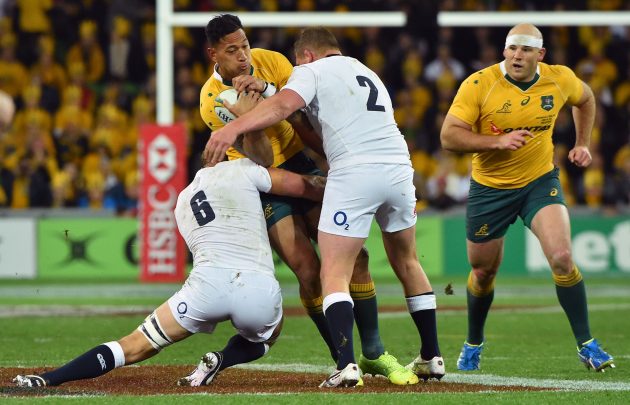We highlight the defensive principles that helped England land a phenomenal victory over Australia in the second Test.
Initiating an orchestrated media campaign prior to any sporting contest represents a risky ploy. By giving bold predictions and belligerent messages, you are effectively beating an egg for others to catapult all over your face in the event of unsatisfactory results.
Over recent weeks though, Eddie Jones has played a blinder. Bodyline references were backed up by blood-and-thunder attrition in Brisbane as England overturned Australia 39-28. Then, when his team travelled to Melbourne to seal the series, the theme was how desperate they were to clinch the series.
The word punctuated just about every press conference and interview during the build-up to last Saturday. Its repetition bordered on monotony. But then the tourists stayed true to their term, turning out an epic defensive performance.
Paul Gustard is famed for innovative techniques – wolves and snakes have been brought to Saracens sessions – and after the 23-7 victory at AAMI Park he revealed that Dale Wimbrow’s 1934 poem ‘The Guy in the Glass’ had been recited to the England squad with the purpose of encouraging deep introspection.
Numbers only tell part of the story. Australia had 71 per cent of possession and 74 per cent of territory, but could not break a side that made 182 tackles. While not as lengthy as Wales’ 49-phase stand against Ireland 18 months ago, nor in fact their own rearguard of over 20 phases on the stroke of half-time in this game, one second-half spell of around two minutes defined England’s effort and demonstrated the following defensive principles as a collective:
- Work-rate and dynamism
- Mutual trust and communication
- Targeted disruption of key opponents
- Understanding of when to blitz aggressively and when to drift passively
- Awareness of the referee’s viewpoint and law interpretation
- Sound, streetwise disciplined decision-making in the tackle area
With marginally less than half an hour remaining, Owen Farrell has just kicked a contentious penalty to put the Wallabies 13-7 behind. We join the action as Ben Youngs clears from the ensuing Australia restart.
Reaction and restraint
The strike is weighted well. Chaser Anthony Watson is able to contest and the ball hits the ground before Israel Folau can reach it. However, the Waratahs full-back latches on to the bounce and counters:
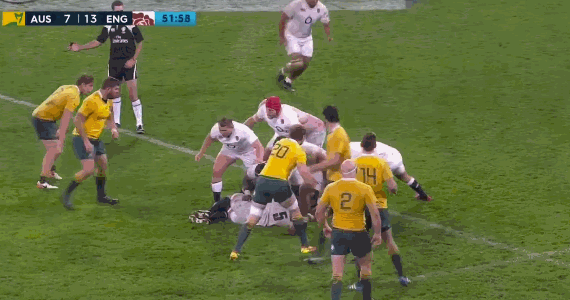
Tracking Youngs’ kick allows us to appreciate England’s off-the-ball industry and reactions. Initially, Watson pursues with Mako Vunipola and Maro Itoje in the background:
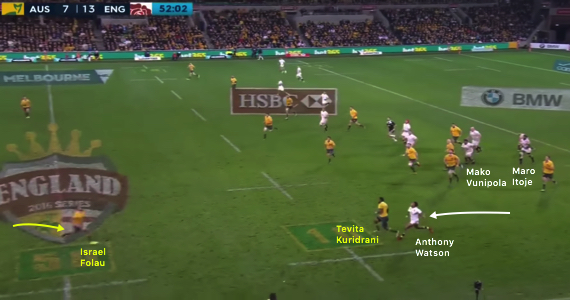
However, the Saracens forwards change direction rapidly as Folau gathers and bypasses Watson:
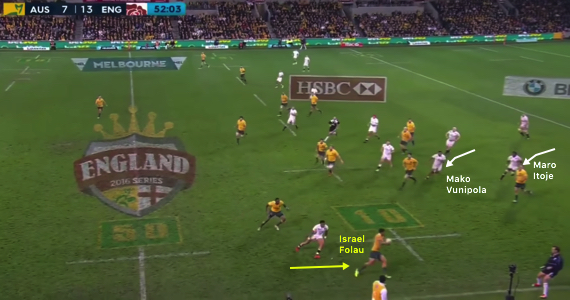
Itoje’s pace in the wider channels proved to be extremely valuable throughout the match and here, he shuts down the carrier’s space quickly. Though Folau steps off his right foot…
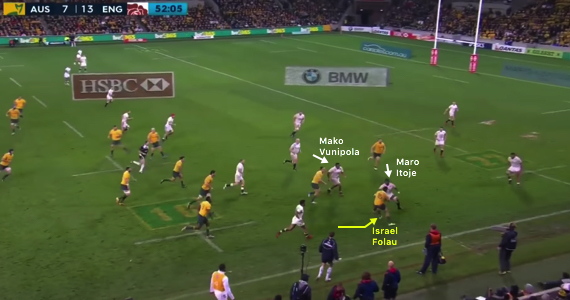
…and pirouettes past the young lock…
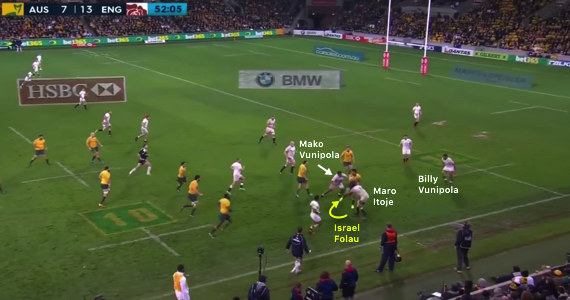
…Mako Vunipola flies across to make a very robust tackle. Having been covering a potential kick return in the back-field, brother Billy Vunipola advances towards the tackle area:
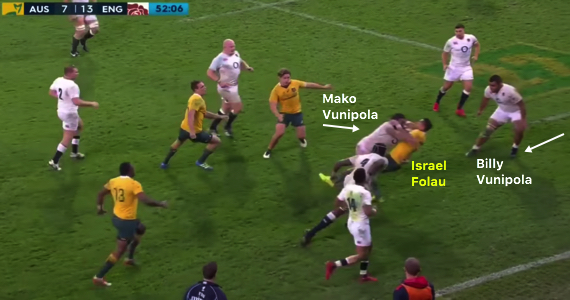
At the start of this year, the Saracens siblings were still the subject of jibes about their body composition. People still questioned their work-rate. Hopefully this series has finally killed off such lazy preconceptions. Certainly, this passage underlines the graft each of them gets through in each encounter.
Despite the proximity of Tevita Kuridrani, Billy Vunipola shapes to attack the ball…
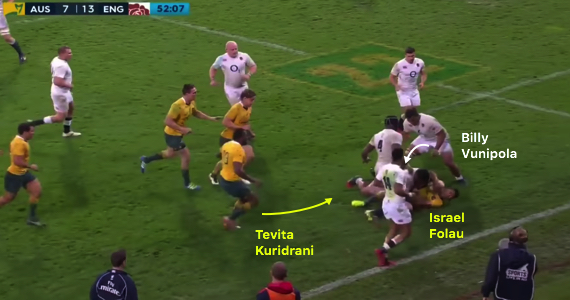
…but, with Dan Cole retreating into the defensive line alongside him, Billy Vunipola leans in and pushes off his brother Mako as Michael Hooper and Dane Haylett-Petty near the breakdown:
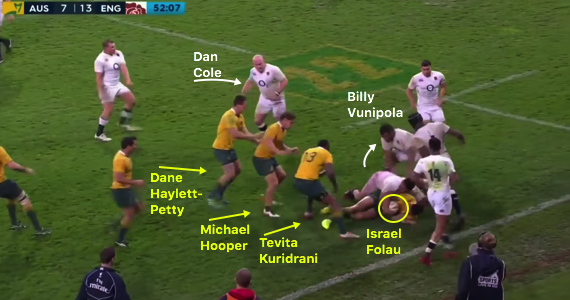
On the microphone of referee Craig Joubert, you can hear Billy Vunipola saying “leave it, leave it” and the Saracen sashays right into the line, pushing Cole further out onto the openside. Meanwhile, Youngs starts organising as well. He tells Itoje to adopt the guard position on the openside.
The upshot of Billy Vunipola’s canny decision not to contest is that Australia must commit three clearers to the ruck. Not including scrum-half Nick Phipps, there are four Wallabies tied up in this tackle, with only Mako Vunipola from England in the same breakdown:
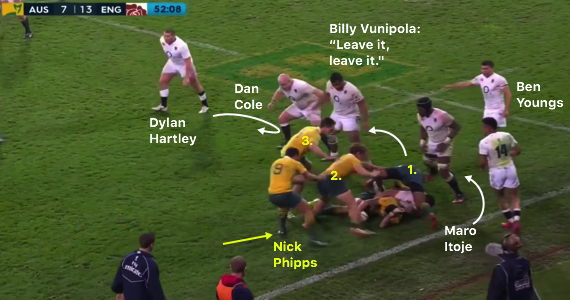
Most of the defensive line is set, although Cole is still sidestepping into place. As Phipps locates a three-man pod of forwards, there are spaces of about two metres between each England defender – as delineated by the dash between Billy Vunipola and Itoje.
Adopting a four-point stance like a sprinter in the blocks, George Kruis, looks eager to burst off the line towards Ben McCalman:
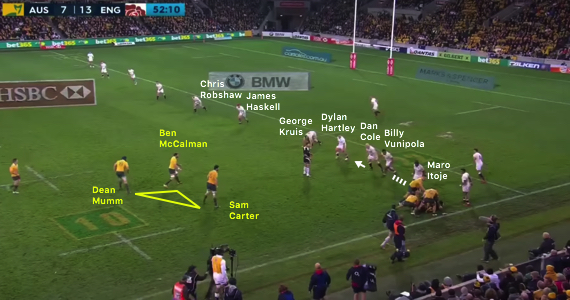
Sure enough, Kruis and Billy Vunipola blitz forward in a sort of pincer movement to make the tackle. In England’s system, individuals are trusted to shoot out of the line if they are confident of making the tackle. Therefore, it is no concern that Hartley and Cole are left behind.
As McCalman is felled though, watch Hooper and Haylett-Petty retreating in a straight line from the previous ruck to give Phipps an outlet on the blindside. Splitting the field in this manner is a prime weapon against such aggressive defence:
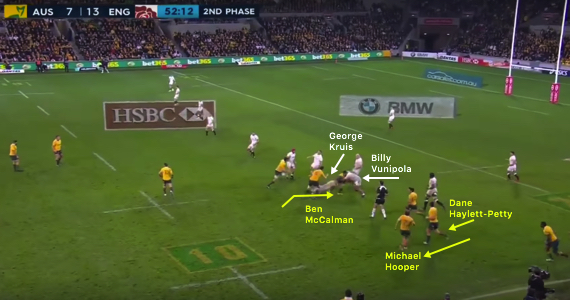
Fortunately, Itoje holds a position on the blindside as Phipps bounces back to his right. Scrum-half Ben Youngs also resists the urge to run around the corner, coming up into the line as his opposite number switches play:
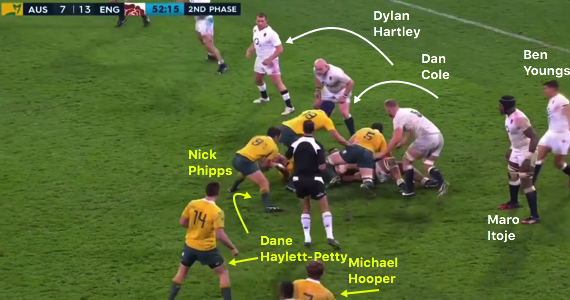
Haylett-Petty gets lucky with a ricochet, forcing Mike Brown and Youngs to make a scrambling cover tackle:
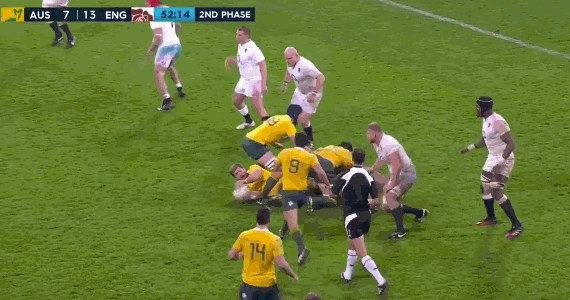
From here, England are in survival mode, but remain calm. Brown recovers his feet almost immediately, dodging Phipps’ attempt to clear him out.
Believing the ball to be out of the breakdown, Brown then edges around the ruck. Crucially though, he checks with Joubert before picking it up. Joubert makes it clear that Australia would be awarded a penalty, so Brown leaves everything alone.
Meanwhile, Kruis, Cole and Hartley are back in the line:
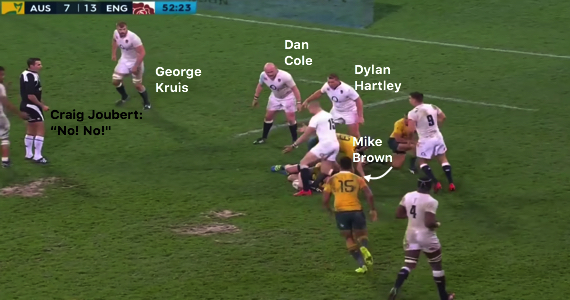
Defensive delay
On this phase, we see a major benefit of competing at the breakdown:
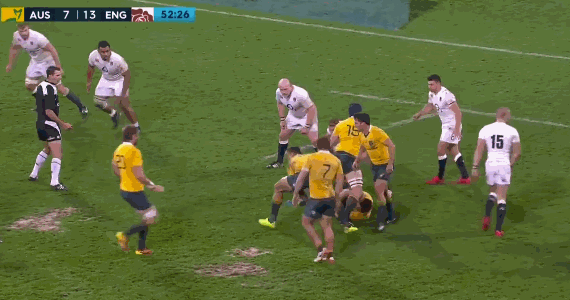
Lock Sam Carter is the next Australian to carry. Look at the time on the clock when Kruis makes the tackle. Then, as Cole swoops towards the ball, note that four clearers are required to recycle possession:
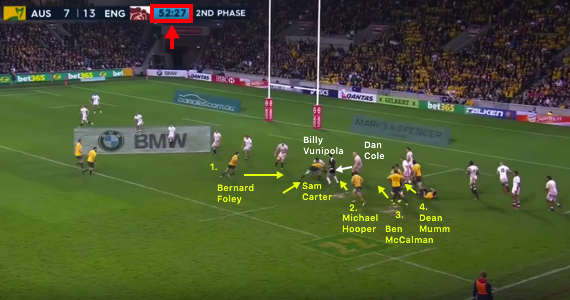
The tenacity, strength, size and technique of Cole means it takes six seconds for the ball to become available again. According to Prozone data, Australia averaged 2.7-second rucks during their 33-13 triumph at Twickenham during the 2015 World Cup.
Such a delay means that when Phipps is next able to pass it out, England have set themselves.
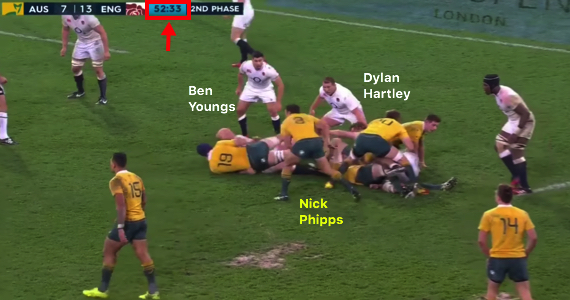
The tireless James Haskell and Kruis are next to make a double-hit on Toby Smith. Again, start the clock:
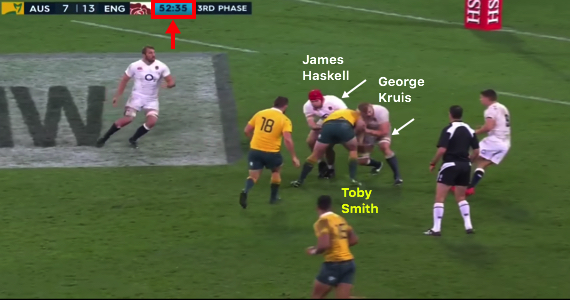
Haskell and Kruis attempt to hold their opponent above the floor to form a maul, requiring Stephen Moore and Greg Holmes – the two remaining Wallaby front-rowers – to charge into the melee and attempt to force Smith to ground:
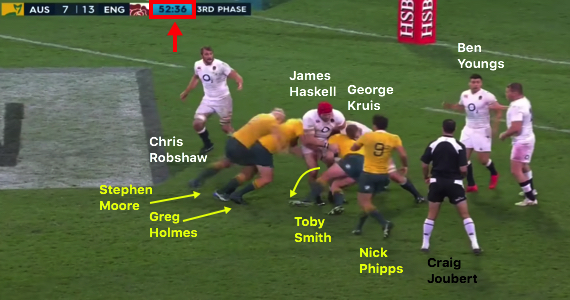
They manage that, and Haskell is trapped on the wrong side in full view of Joubert, who had penalised him twice for precisely this in the first half.
Demonstrating the organisation that can be done while defenders make it difficult for the attack to recycle, Robshaw calls Hartley towards him:
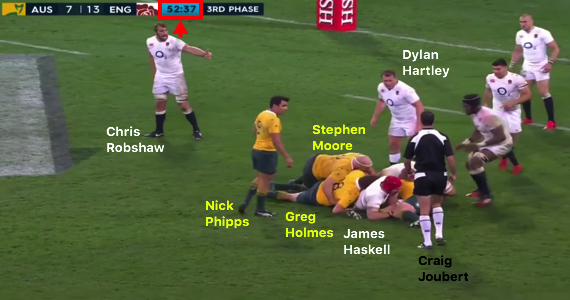
With a mighty effort, Haskell hauls himself off the tackled player as Itoje arcs around into the left-hand guard position:
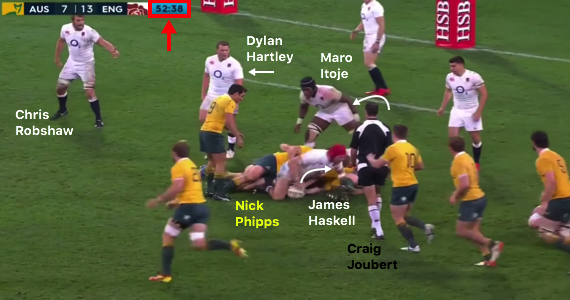
This convinces Joubert not to penalise Haskell, although the ball comes free, ending a ruck that has lasted three seconds…
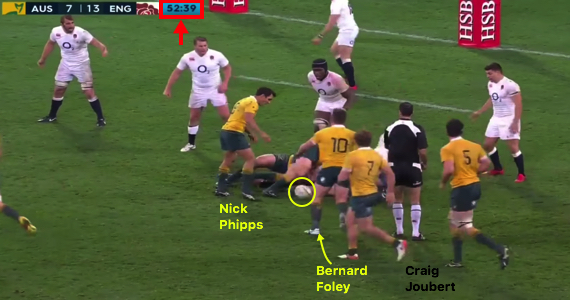
As Bernard Foley scoops up, a hugely frustrated Phipps snaps at Joubert, making it clear that he believed Haskell to have moved the ball while on the floor:
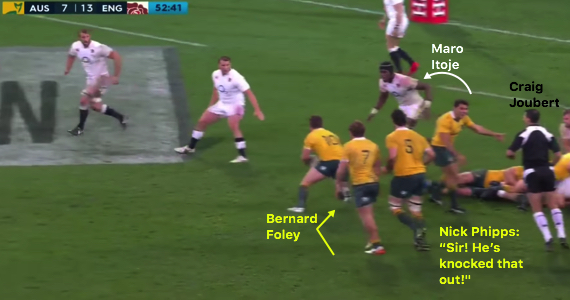
Itoje fells Foley…
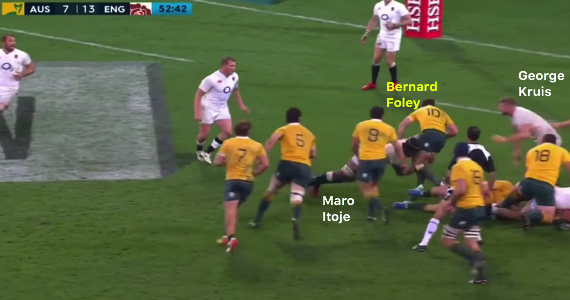
…and once more Australia gravitate towards the ruck, with four joining it without a single Englishman to clear out:
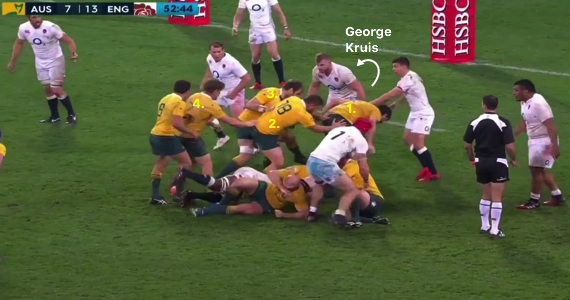
This allows the tourists to deal with the following two phases fairly easily. First Hartley and Robshaw bring down Scott Fardy…
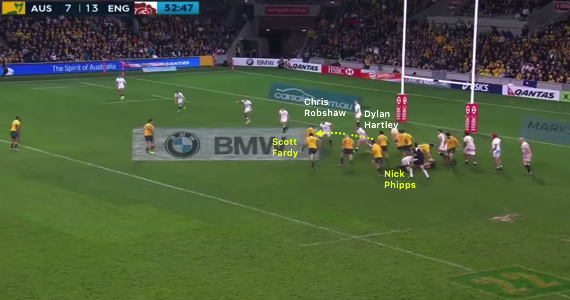
…making a double-hit…
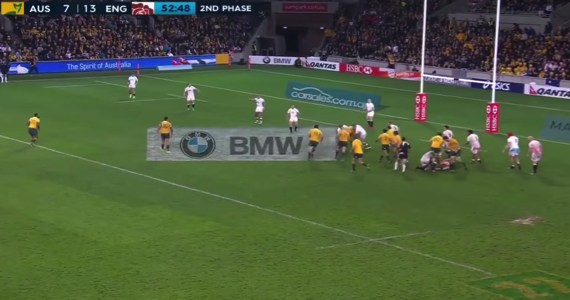
…with Hartley threatening the ball briefly as Hooper comes around the corner:
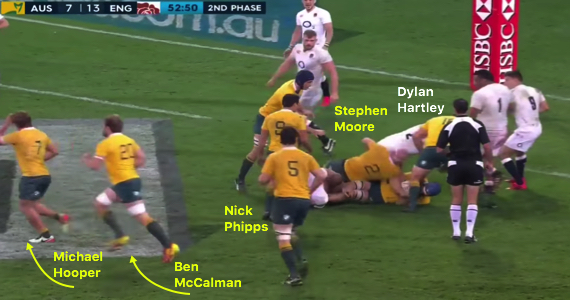
Note that Mako Vunipola, who made the tackle on Folau at the start of this attack, is back at guard with Kruis spaced well to his right:
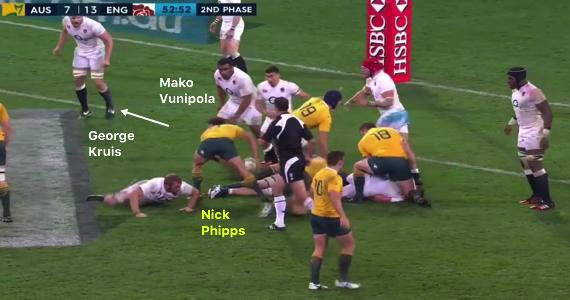
Hooper is met by George Ford and Kruis but Australia are able to recycle quickly. England’s resources are now stretched, as Farrell (circled) indicates:
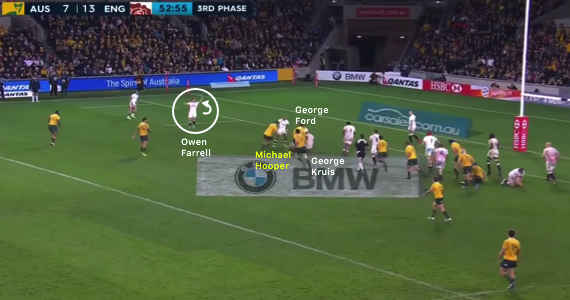
This message is passed from out to in, with Jonathan Joseph…
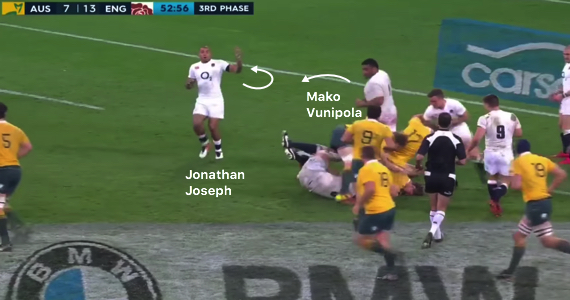
…and then Brown shepherding forwards into position:
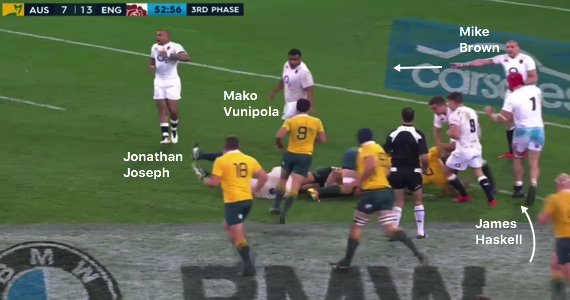
As a result, when Phipps releases his backs, hitting Folau at first receiver, England have plenty of men on their feet in the defensive line:
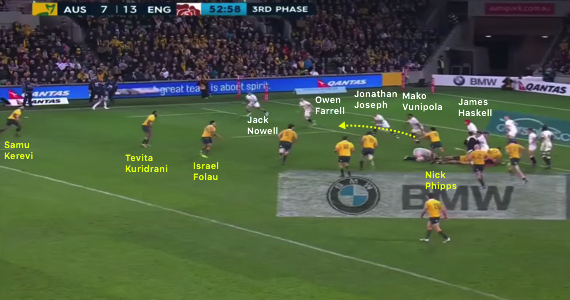
They come forward as Folau throws a miss-pass to Samu Kerevi…
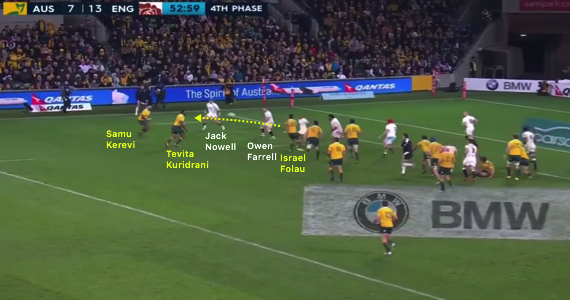
…before Jack Nowell and Farrell wrap up the Reds centre. Start the clock again:
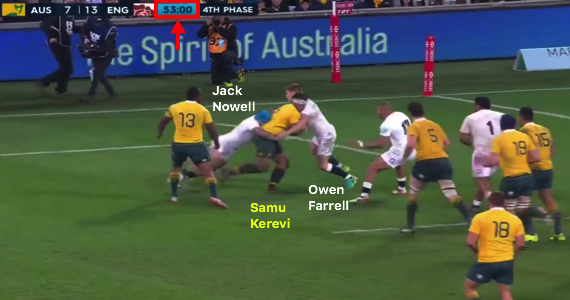
Nowell and Farrell hold up Kerevi for two seconds, forcing Carter and Mumm to hurl themselves into the tackle area:
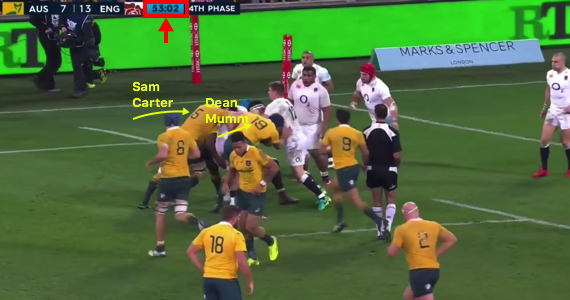
In the wake of a superb win, Gustard admitted that stalling Australia in contact had been an instrumental part of the defensive performance.
Again, England’s players roll clear to appease the referee and only after seven seconds have elapsed can Phipps restart the attack:
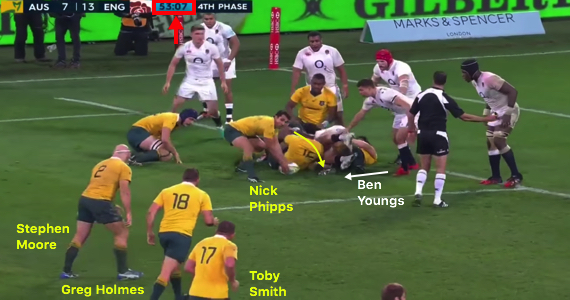
One-man blitz
Robshaw and Itoje stop Moore on the next phase…
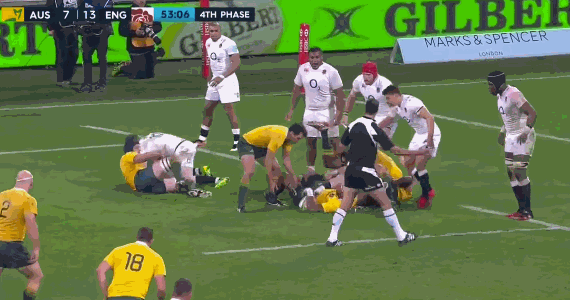
…and Foley now decides it is time to spread play, calling for the ball from Phipps with his team’s two most dangerous runners on the outside:
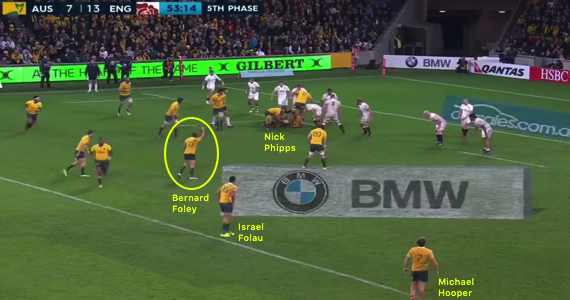
The fly-half receives as the England line advances before sending Folau on an arc towards Ford’s outside shoulder, a very similar line to the one that brought a try in Brisbane.
At this point, Watson makes the do-or-die decision to leave his wing and jam in hard:
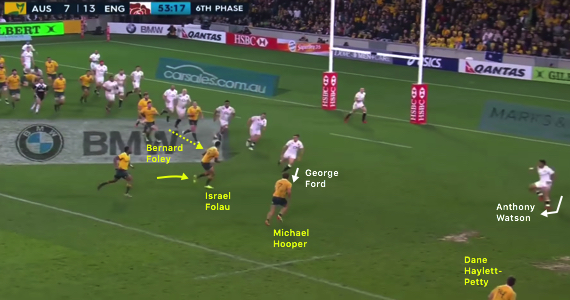
Leaving Haylett-Petty alone, the Bath man aims at Hooper. Watch Brown trying to cover the vast expanse on the right:
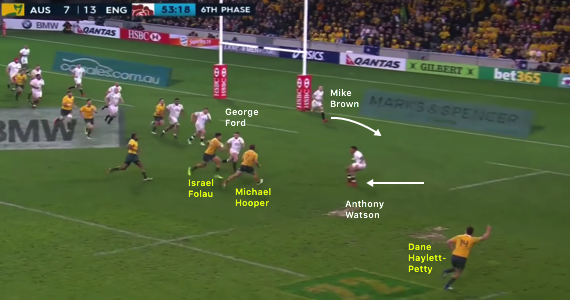
Blindsided and possibly surprised by Watson’s pace, Folau does not throw a pass over the top. Instead, he holds on and collides with Hooper:
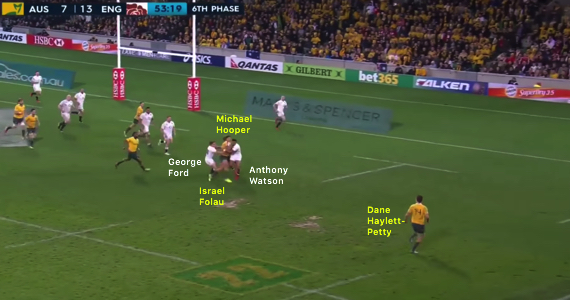
England could have had a penalty for crossing or at least a scrum for accidental obstruction, but neither comes.
Instead, Ford completes the tackle and Kuridrani clears out Watson. Billy Vunipola and Hartley arrive on the scene next…
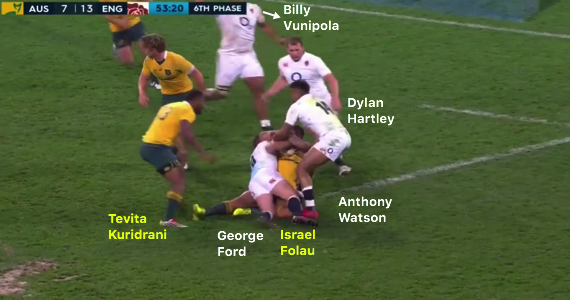
…and, with the ruck over because Kuridrani has driven Watson beyond the ball, Hartley senses a chance to steal:
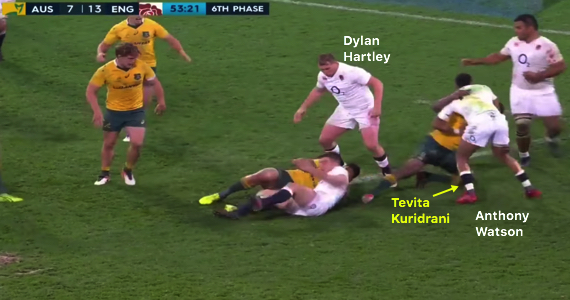
He dives in with Rob Horne competing…

…and Australia only recycle because Horne collapses, sealing off the ball:

Stopping the source
Hartley wriggles free as four Wallabies committ to the breakdown. Robshaw, prompted by Brown, then calls over Hartley to bolster the other side of the ruck:
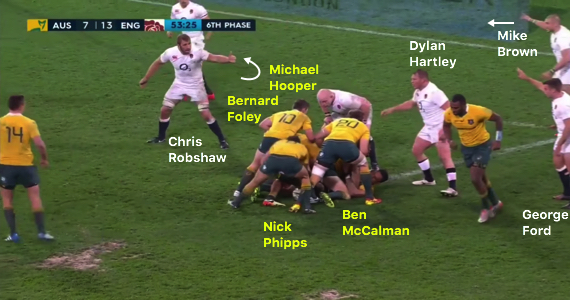
Kerevi is next to barrel forward, with Kruis, Mako Vunipola and Robshaw meeting him:
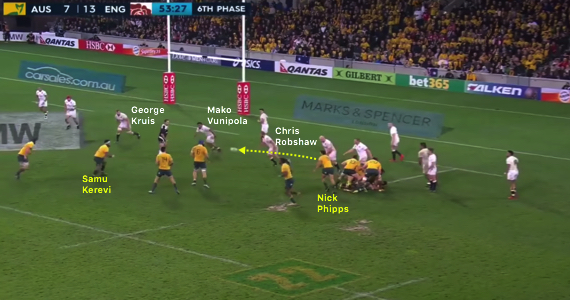
Kruis and Mako Vunipola upend Kerevi and with Robshaw circling, Fardy and Mumm must support their colleague:
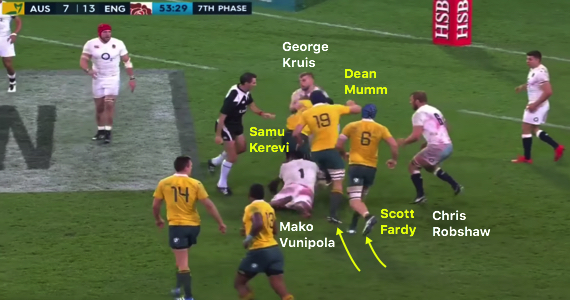
As Cole fills in at guard, the Wallabies take out Robshaw…
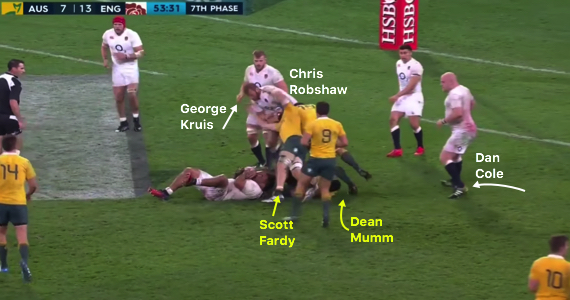
…but again, the ruck is over when Robshaw is driven out the other side. Cole is free to attack Phipps – another tactic England used throughout:
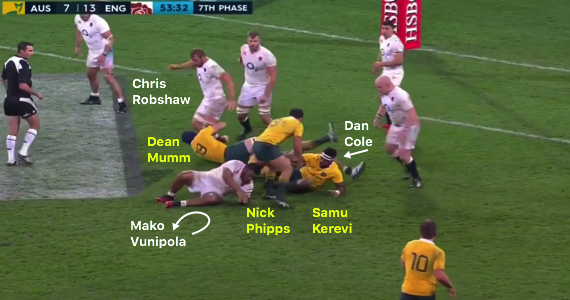
While Foley looks to organise the next phase with Horne, Phipps is quick enough to snatch the ball and dart away…
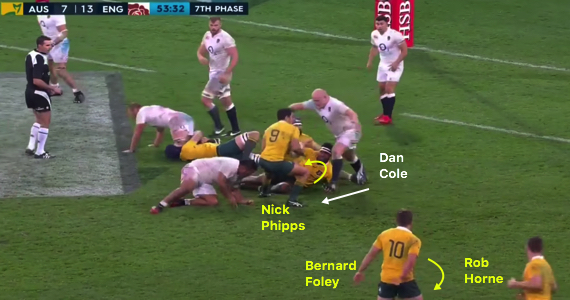
…however, Cole hauls him in:
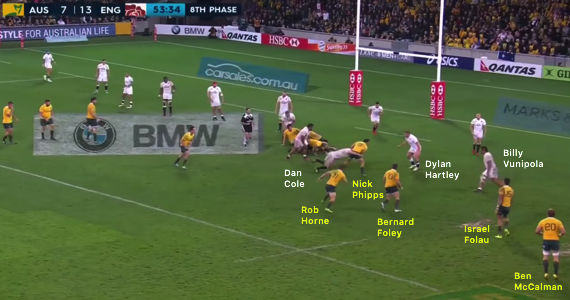
Billy Vunipola then has a sniff at the ruck amid the attentions of Foley and Horne…
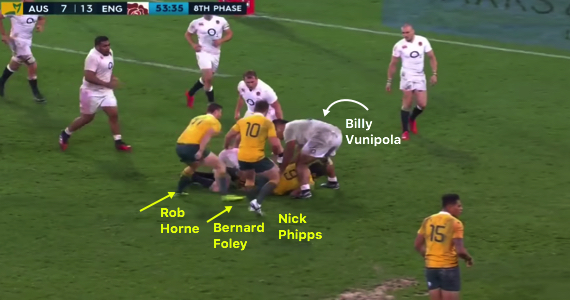
…but, in exactly the same manner as he did at the beginning of this defensive set, the 23 year-old pulls away, staying on his feet…
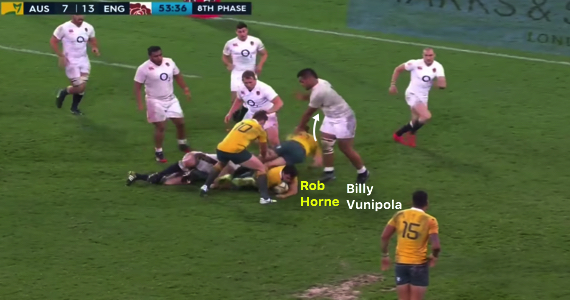
…and directing Youngs towards the guard position him, with Brown filling in on the outside:
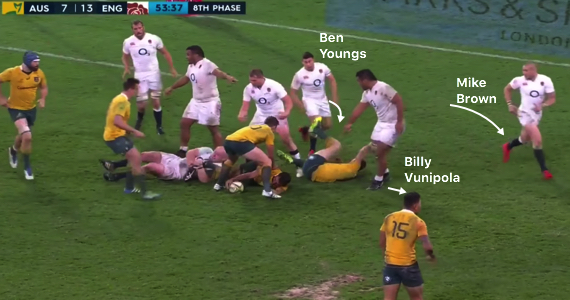
Shouldering responsibility
Hartley is the chief protagonist to keep an eye on here. Because Phipps is stuck in the ruck, Haylett-Petty steps up at scrum-half…
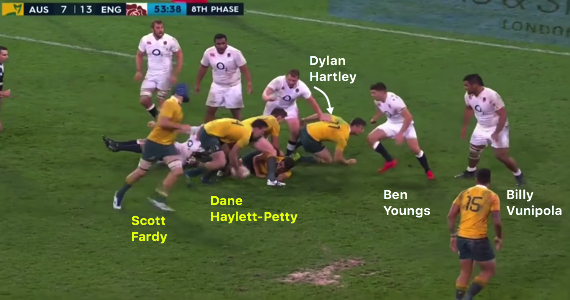
…and barges through Youngs.
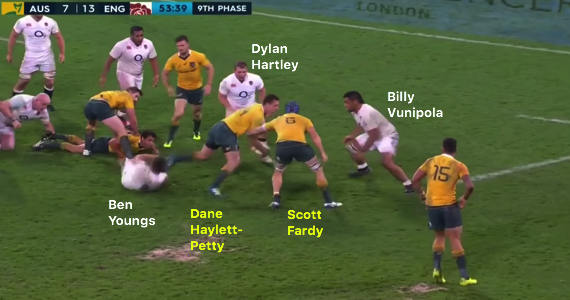
Fardy latches on, adding his weight to the carry:
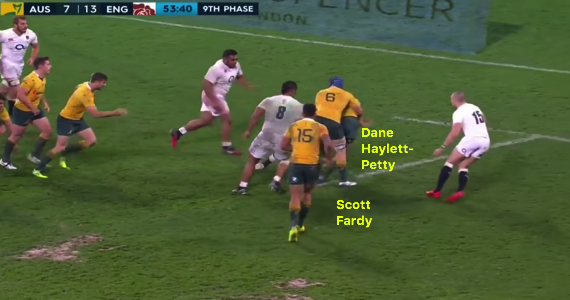
But, with Brown’s aid, Hartley just about drags down Haylett-Petty:
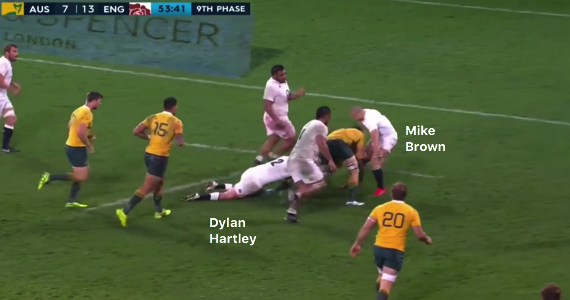
Brown, Robshaw, Mako Vunipola and Billy Vunipola reach the ruck to ward off any further pick-and-gos.
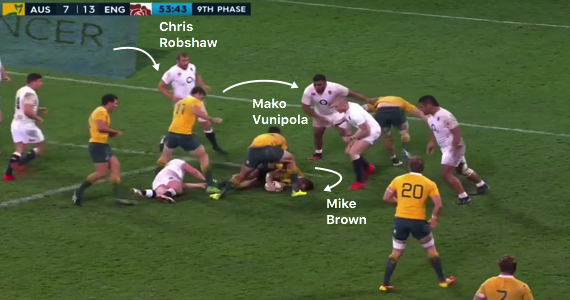
Over and out
Australia look back to the left, and their attack ends on its 10th phase:
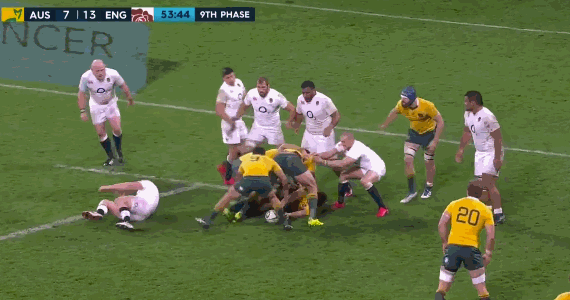
As carrier Mumm receives the ball, the England defensive line is loaded with enough bodies to envelop an isolated carrier:
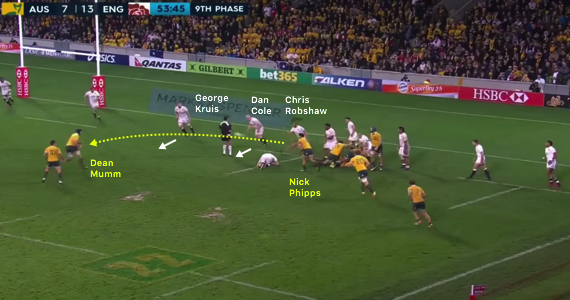
Sure enough, Cole and Kruis make a solid hit on the former Exeter Chiefs second-row:
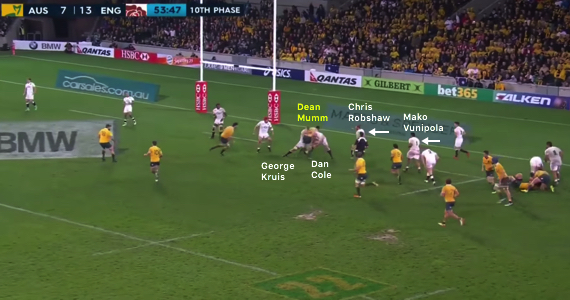
Robshaw swoops around and adopts a strong stance that Carter cannot shift, but look at Mako Vunipola in this final screenshot:
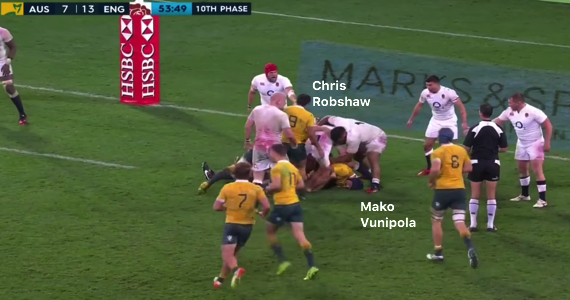
This is not the kind of contribution that features in match statistics. Still, it epitomises the selfless industry of this defensive display as a whole.
Latching on to Robshaw to galvanise his position over the ball and make him more difficult to move, Mako Vunipola is a big part of the turnover.
Australia came again, but England held out, breaking their opponents’ spirit a little more with each rearguard until Farrell’s try won the series in the final moments. A final onslaught from the wounded Wallabies awaits in Sydney, but Gustard and Jones can be extremely confident in their defensive operation.





